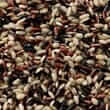Background
- Altering the outer shell of rice bran using enzymes from Hyphomycetes mycelia mushroom extract produces Arabinoxylan compound. The product called MGN-3 (or BioBran® in Japan) is a complex containing arabinoxylan as a major component.
- Arabinoxylan has been found to improve immune reactions in diabetes and cancer patients. MGN-3 may also be of potential value in treating AIDS patients or those patients undergoing chemotherapy. However, there is currently a lack of strong human scientific evidence to support the use of arabinoxylan for any indication.
- Although presented by manufacturers as a generally safe substance without side effects at recommended doses, the United States Food and Drug Administration (FDA) ordered a permanent court order in 2004 against the marketing of MGN-3, charging that it has been promoted as a drug treatment for cancer, diabetes and HIV.
References
- Anonymous. Clinical Research Using MGN-3. Cancer: the interface between basic and applied research 2001.
- Ghoneum M, Jewett A. Synergistic effect of modified arabinoxylane (MGN-3) and low dose of recombinant IL-2 on human NK cell activity and TNF-a production. American Academy of Anti-Aging Medicine, Education Conference 1998.
- Ghoneum M, Maeda H. MGN-3 immunotherapy for the treatment of cancer [abstract]. First International Symposium on Disease Prevention by IP-6 and other Rice Components 1998.
- Ghoneum M, Namatalla G. NK Immunomodulatory function in 27 cancer patients by MGN-3, a modified arabinoxylane from rice bran. 87th Annual Meeting of the American Association for Cancer Research 1996.
- Ghoneum M, Namatalia G, Kim C. Effect of MGN-3 on human natural killer cell activity and interferon-y synthesis in vitro. FASEB 1996;10(6):26-32.
- Ghoneum M. Enhancement of human natural killer cell activity by modified arabinoxylane from rice bran (MGN-3). Int J Immunotherapy 1998;14:89-99.
- Ghoneum M. NK immunorestoration of cancer patients by MGN-3, a modified arabinoxylan rice bran (study of 32 patients followed up to four years). 6th International Congress on Anti-Aging and Bio-Medical Technologies 1998.
- Ghoneum MH. Immunomodulatory and anti-cancer properties of (MGN-3), a modified xylose from rice bran, in five patients with breast cancer. American Association for Cancer Research Special Conference: The interface between basic and applied research 1995.
- Ghoneum MH. One sizeable step for immunology, one giant leap for cancer patients. Townsend Letter for Doctors and Patients 2000;58-62.
- Ghoneum M. Anti-HIV activity in vitro of MGN-3, an activated arabinoxylane from rice bran. Biochem Biophys.Res Commun. 2-4-1998;243(1):25-29.
View Abstract - Ghoneum M, Vojdani A, Banionis A, et al. The effects of carcinogenic methylcholanthrene on carbohydrate residues of NK cells. Toxicol.Ind Health 1997;13(6):727-741.
View Abstract - Jacoby H, Wnorowski G, Sakata K, et al. The effect of MGN-3 on cisplatin and adriamycin induced toxicity in the rat [abstract]. Supplement to Gastroenterology 2000;18(4):4962.
- Kanari M, Tomoda M, Gonda R, et al. A reticuloendothelial system-activating arabinoxylan from the bark of Cinnamomum cassia. Chem Pharm Bull (Tokyo) 1989;37(12):3191-3194.
View Abstract - Lu ZX, Walker KZ, Muir JG, et al. Arabinoxylan fiber, a byproduct of wheat flour processing, reduces the postprandial glucose response in normoglycemic subjects. Am J Clin Nutr 2000;71(5):1123-1128.
View Abstract - Uyemura K, Tarchiki K, Ghoneum M, et al. MGN-3, a novel antitumor agent. 92nd Annual Meeting, American Association for Cancer Research 2001;42:24-28.







